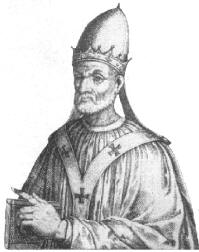 Martin
IV, né Simon de Brion (ca. 1210 – March
28, 1285), held the papacy from February 21,
1281 until his death.
Martin
IV, né Simon de Brion (ca. 1210 – March
28, 1285), held the papacy from February 21,
1281 until his death.Simon de Brion was born in France at Montpensier Castle in the province of Touraine (near Tours), in about 1210. He spent a brief period as a priest in Rouen, then served as canon and treasurer at the church of St. Martin in Tours.
In 1260, he was made chancellor of France by Louis IX of France.
In December of 1262, he was made cardinal-priest (nominally in charge of the church of St. Cecilia) by Pope Urban VI.
He served as a legate for Urban VI and also for his successor Clement IV in the negotiations for the assumption of the crown of Sicily by Charles of Anjou, with whom he became deeply politically entwined. Later, Pope Gregory X sent him again as legate to stem the abuses of the Catholic Church there; there he presided over several synods on reform, the most important of which was held at Bourges in September, 1276.
Six months after the death of Pope Nicholas III in 1280, Charles of Anjou intervened in the papal conclave at Viterbo by imprisoning two influential Italian cardinals, on the grounds that they were interfering with the election. Without their opposition, Simon de Brion was unanimously elected to the papacy (taking the name Martin IV) on February 22, 1281.
Viterbo was placed under interdict for the imprisonment of the cardinals, and Rome was not at all inclined to accept a hated Frenchman as Pope, so Simon was crowned instead at Orvieto on March 23, 1281. (Though he was only the second pope to choose the name Martin, he is now known as Martin IV, because the Popes Marinus I and Marinus II have historically been listed among the Martins.)
Dependent on Charles of Anjou in nearly everything, the new Pope quickly appointed him to the position of Roman Senator. At the insistence of Charles, Martin excommunicated the Byzantine emperor Michael VIII Palaeologus, who stood in the way of Charles' plans to restore the Latin Empire of the East. He thus broke the tenuous union which had been reached between the Greek and the Latin Churches at the Second Council of Lyons in 1274, and further compromise was rendered impossible.
In 1282, Charles was overthrown in the violent massacre known as the Sicilian Vespers. The Sicilians had elected Peter III of Aragon as their king, but Martin used all the spiritual and material resources at his command against him, trying to preserve Sicily for France. He excommunicated Peter III, declared his kingdom of Aragon forfeit, and ordered a crusade against him, but it was all in vain.
Pope Martin IV died at Perugia on March 28, 1285.
Among the seven cardinals created by Martin was Benedetto Gaetano, who afterwards ascended the papal throne as the famous Pope Boniface VIII.
In the Divine Comedy Dante sees Martin in Purgatory, where the reader is reminded of the former pontiff's fondness for eels and wine.

